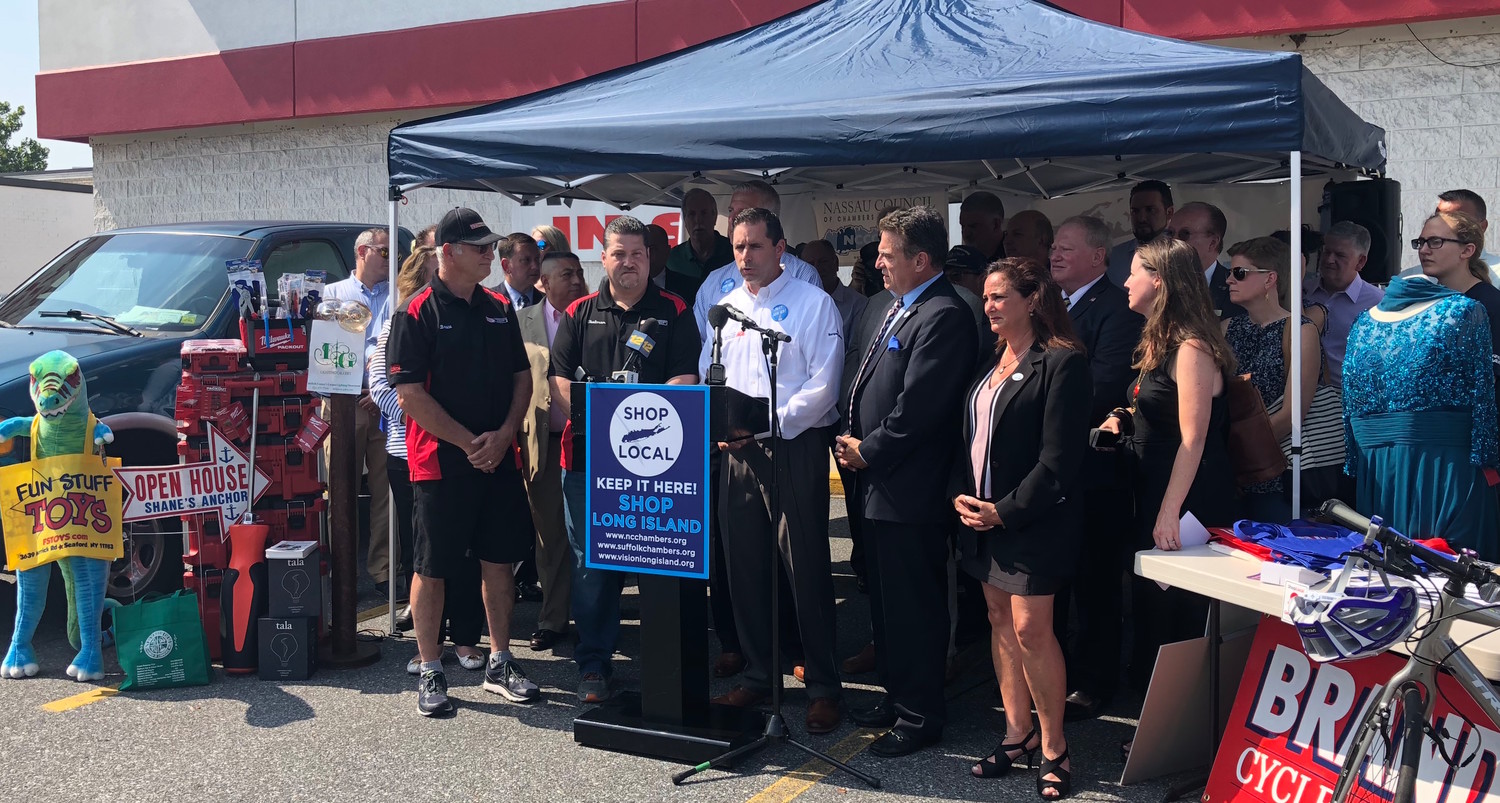Local retailers push for level playing field
Following a recent U.S. Supreme Court decision, Elmont and Franklin Square business owners are calling for state legislation that they say would level the playing field between in-state and out-of-state online retailers.
The high court’s June 21 decision, South Dakota v. Wayfair et al., will now permit states to mandate a sales tax for items bought online from out-of-state retailers. And local retailers want New York state to ensure that a sales tax is charged, regardless of the sites from which online shoppers make their purchases.
“We’re very pleased,” said Paul Sapienza, owner of Sapienza Bakery and president of the Elmont Chamber of Commerce. “This finally has the effect of leveling the playing field.”
Sapienza said that local brick-and-mortar businesses were struggling. “Any internet sale hurts us, because we have to charge the extra 8 percent-plus sales tax,” he explained. “I may be dating myself, but before the internet, we had catalogue and mail order sales. They gave you a chart, and purchasers always had to add in the sales tax. How is the internet any different?”
In theory, online purchasers are supposed to add the sales tax now. But most do not, and no mechanism currently exists to enforce the re-quirement.
Local business owners said that strong support from a number of state and local legislators gave them confidence that such legislation would eventually be approved, and they hoped that a special session of the State Legislature would be called to address the issue before the next session begins in January.
Michael Harrison, president and CEO of Axcelsior Strategic Solutions and a Chamber of Commerce consultant, said that the current state of affairs “creates an un-level playing field. We need legislation to be able to begin, and the South Dakota law should be a model,” Harrison said.
The South Dakota measure has stipulations: Out-of-state online retailers are required to levy the tax only if their South Dakota sales exceed $100,000, or if they have more than 200 separate transactions with South Dakota customers. New York’s law should be as simple to follow, Harrison said.
Long Island Regional Council Chairman John Cameron, of Rockville Centre, estiamated that Nassau and Suffolk counties could end upwith as much as $100 million in new revenue, but cautioned that even such a boon “isn’t a silver bullet.” According to a report entitled “Tax Alternatives for Long Island” that the council released earlier this year, the county needs to raise some $500 million in annual revenue. In the report, the council proposed a hike in the sales tax to 8.875 percent, the rate charged by New York City businesses, from the current 8.625
percent.
“[Wayfair] is a help for municipalities, because it represents direct money,” as opposed to revenue that has to be levied, Cameron said. But it isn’t only the loss of business that is a concern. “Mom-and-pop stores are part of the local tax base,” he said. “When they fail, the commercial tax base is stressed. When that happens, residential rates have to go up.”
Cameron added that online retailers don’t only challenge purveyors of goods. Companies like Amazon also undercut service businesses, such as United Parcel Service and Federal Express. “They’re getting clobbered,” he said.
Nassau County Executive Laura Curran said the ruling “gives a tremendous boost of confidence to local businesses that struggle to compete with Internet commerce.”
“It would be a win-win all around,” said Nassau County Legislator Arnold Drucker, who attended the July 16 rally. “It would be a win-win for the state, for Long Island and for the community. America was built on brick-and-mortar stores. They are the middle class, and we’ve gotten away from supporting them.”
Eric Alexander, director of Vision Long Island, said, “It’s time for customers to put their resources where their heart is and invest in these businesses.”
James Gazzale, a representative of the state Department of Taxation and Finance, said last week that state officials were reviewing the Supreme Court decision.
The ruling itself is a departure from the court’s practice of the past 40 years, according to the dissent filed by Chief Justice John Roberts. Jr., who was joined by three of the court’s more liberal justices — Stephen Breyer, Elena Kagan and Sonia Sotomayor. Roberts wrote that according to the Constitution, regulating interstate commerce is more appropriately the job of the Congress rather than the courts.
With the chief justice in dissent, Wayfair might not be the high court’s final word on the subject. “It was a split decision,” Cameron said. “They’ll probably want to revisit it at some point.”
Timothy Denton contributed to this story.






